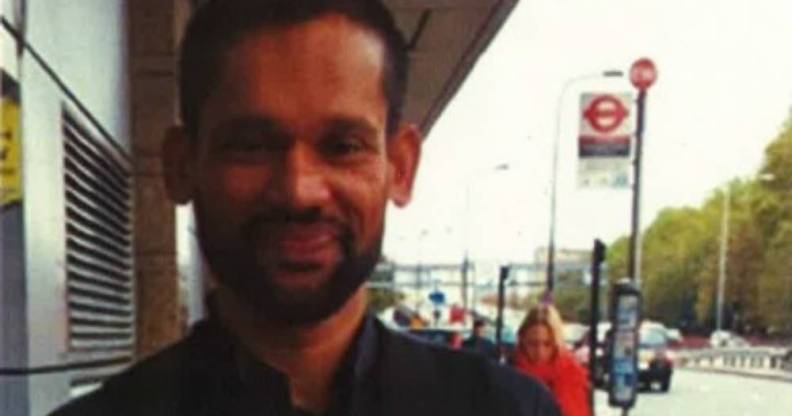Suspect charged with killing gay man in brutal hammer attack in London cemetery denies murder

Ranjith Kankanamalage was found dead in a London cemetery. (Metropolitan Police)
A man has denied killing gay man Ranjith Kankanamalage with a hammer in a historic east London cemetery last year.
Kankanamalage, a 50-year-old known affectionately by friends as “Roy”, had lived in Tower Hamlets borough for years before he was found dead on 15 August 2021.
In a suspected homophobic killing that deeply rattled a nation already reckoning with ever-increasing anti LGBT+ hate crimes, Kankanamalage was found with “catastrophic head injuries” in Tower Hamlets Cemetary Park.
Erik Feld, a 36-year-old who lived on Tredegar Road, appeared at the Old Bailey via video-uplink on Tuesday (12 April). He pleaded not guilty to murder, the BBC reported.
Feld will stand trial on 6 March 2023, with a further case management hearing pencilled in this year on 15 July.
What happened to Ranjith Kankanamalage?
Ranjith Kankanamalage, a Sri Lankan national, had last been seen walking alone in the cemetery, a known cruising spot.
Passersby discovered him at 6:55am, finding the man slumped on the ground and suffering from 11 blows to his head.
First-responders rushed to the park at 7pm – he was pronounced dead at the scene. A post-mortem found that he died as a result of “blunt force trauma to the head”.
Detectives, who suspect the attack was motivated by homophobia, believe that he did not know Feld. He was arrested on 20 August before being released on bail and re-arrested in January. A second man, 41, was arrested in October.
It was a grisly case that shocked and appalled London’s LGBT+ community, one already on edge as hate crimes rise and many see the police as indifferent to their plight.
London’s Metropolitan Police Service’s handling of the killing raised serious questions about how the force investigates the killings of LGBT+ people.
Trust in law enforcement had already been tested following the deaths of four queer men at the hands of Stephen Port. An inquest concluded earlier this year that if a laundry list of police failings had not been committed, some of his victims may still be alive today.
Britain’s police watchdog, the Independent Office for Police Conduct, went on to uncover a disturbing pattern of homophobia and bullying within the Met.
The Met faced questions once again over its competency when a police spokesperson told the press that LGBT+ people should “prioritise their personal safety by being aware of their surroundings, avoiding listening to loud music, and avoiding dimly-lit areas where possible”.
Officers have since worked alongside queer community leaders and groups in an effort to assure LGBT+ Londoners they are safe.
“Whilst such incidents are thankfully still very rare in London, I want to reassure that community that my officers and specialist detectives are working tirelessly to bring those responsible to justice,” Detective Chief Superintendent Marcus Barnett said at the time.
“I also want to be really clear that there is no place, at all, in London for any form of hate crime and the Met is absolutely committed to tackling it and supporting victims. We are here for you.”

